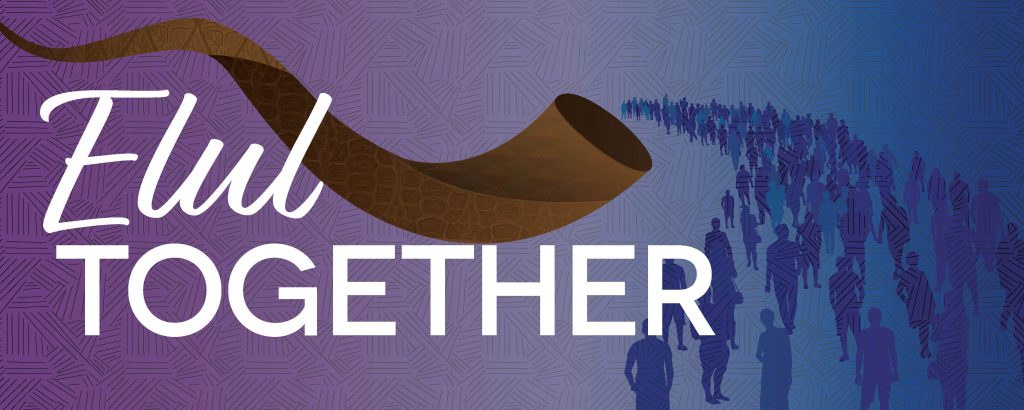Hebrew College’s response to coronavirus
COVID Policy Update: March 9, 2022
The Centers for Disease Control has eased mask recommendations for the vast majority of the country and most mask mandates have been lifted locally as well. These changes come in response to a significant decrease in infection rates and the proven increase in protection against severe illness because of the effectiveness of vaccinations and boosters.
Therefore, effective Monday, March 14, 2022 students, faculty, staff, renters, and visitors at Hebrew College will no longer be required to wear masks indoors.

Learning Together from a Distance
As colleges and universities across the country braced for the impact of remote learning, we found our faculty and staff, ready, willing, and able to make the shift. Here’s what we did…
Watch “A Time to Mourn: Grieving Together In the Time of COVID”
On July 9, we paused to mourn those lost during the COVID pandemic thus far. We chose the 17 of Tammuz, Shivah Asar B’Tammuz for the event because this date is already a day of mourning in our tradition. The event video is available on demand.
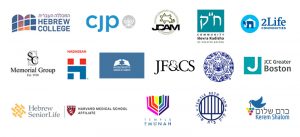
We also encourage you to visit the JTA’s “Bonds of Life” website, which mourns members of the Jewish community from throughout the country, including Greater Boston, who have passed away during the coronavirus pandemic.
Torah for this moment
Speaking Torah Podcast
On Hebrew College’s Speaking Torah podcast, Jewish leaders from around the world read essays from Hebrew College faculty and rabbinical alumni about how Torah can help us navigate the most pressing issues of our time. After listening to the podcast, we hope that you will be left feeling inspired, uplifted, and excited to engage with Torah in a modern, transformative way.
Listen Now on Apple Podcasts, Stitcher, Spotify, or wherever you get your podcasts.
Writings by Hebrew College faculty, alumni and students
- A Trip Down History Lane: Reading My Way Through the Pandemic by Rabbi Dr. Michael Shire
- The Coronavirus Yahrtzeit: Turning Around the Evil Decree by Cantor Ken Richmond
- Teaching My Child to Love the World by Rabbi Shoshana Meira Friedman`14 (Jan. 1, 2021 The New York Times)
- Gratitude by Rabbi Ebn Leader
- Sharing our Legacies by Susan Shevitz
- Unity or Division? by Rabbi Jim Morgan`08
- Refusing to be Comforted by Rabbi Minna Bromberg`10
- What Violence is Being Perpetrated In My Name (And What Am I Going To Do About It)? by Rabbi Avi Killip`14
- Hallelujah for a Good Night’s Sleep by Rabbi Jordan Braunig`14
- Standing Before the Gates: Ne’ilah 5781 by Rabbi Sharon Cohen Anisfeld, President of Hebrew College
- Eych Nashir: How Can We Sing in Exile? by Rabbi Mónica Gomery
- Mapping Our Stories in Fits and Starts by Rabbi Becky Silverstein `14.
- Rabbi Arthur Green discusses his Coronavirus experience in Israel with Interfaith Institute interview with
- President Sharon Cohen Anisfeld discusses faith in the time of COVID-19 on the Jewish Education Innovation Challenge YouTube channel‘s series “Jewish Stories: Jewish Strength.”
- Moving from Corona-Time to Divine-Time by Frankie Sandmel, rabbinical student
- Torah for Sadness: Learn Something by Shani Rosenbaum, rabbinical student
- Coronavirus from the Holy Land by Rabbi Art Green, Rabbinical School Rector
- Torah for Sadness: The Myth of Certainty by Shani Rosenbaum, rabbinical student
- Reflections from Kibbutz HaMaapil During This Time of Corona by Rabbi Lila Veissid `11
- Blessings from Jerusalem by Rabbi Minna Bromberg `10
- What Is Essential by Rabbi Brian Besser `10
- Chaplaincy: Voices from the Field by Rabbi Suzanne Offit `09 and Rabbi Sonia Saltzman `08
- A Time of Radical Remixing by Rabbi Adina Allen `14
- Song and the Journey Out of Egypt by Rabbi Sharon Cohen Anisfeld, President of Hebrew College
- Thought Leadership in a Time of Challenge by Rabbi Jeff Summit, Hebrew College Innovation Lab Director
- Passover During a Pandemic is an Act of Resilience and Hope by Rabbi Sara Tasman `12
- Pre-sah VRitual Gathering for 5780 by Rabbi Laura Bellows `18 and Yavni Bar-Yam
- The Todah Offering in a Dark Time by Rabbi Jim Morgan `08
- Enough is Enough by Rabbi Sharon Cohen Anisfeld, President of Hebrew College
- A Post-Coronial World by Rabbi Arthur Green, Rabbinical School Rector
- Karpas (from the new Hebrew College Passover Companion) written and read by Rabbi Sharon Cohen Anisfeld. Read the Passover Companion online or order your copy.
- Praying Alone, Together by Rabbi Sharon Cohen Anisfeld, President of Hebrew College
- Accepting the Yoke and Areyvut by Naomi Gurt Lind, Rabbinical student
- The Hardness and Brilliance of Waiting by Rabbi Jordan Braunig`14. Watch Jordan deliver this d’var on video.
- Seeking God’s Face in the Age of Coronavirus by Cantor Ken Richmond, Rabbinical Student
- The Work of Our Hands by Shani Rosenbaum, Rabbinical student
Interreligious Teen Projects
COVID Youth Commission
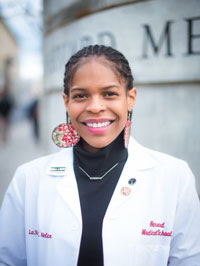
Student ambassadors work on three teams using their collective wisdom and power to create positive change in their communities and inspire others to do the same:
- The Advocacy Team is working to destigmatize the use of food pantries by creating an information campaign and recruiting long-term volunteers, particularly youth.
- Through partnerships with local community members, organizations and businesses, the Direct Service Team is collecting material and financial donations that will enable us to create personal care kits for area homeless shelters
- The Multi-Media Team is working to amplify the work of the Advocacy and Direct Service Teams, and to provide our audience with meaningful and timely COVID resources from local and national experts.
Project partners include We Got Us (pictured above: We Got Us physician-activist LaShyra “Lash” Nolan), Children’s Health Watch, Rosie’s Place, Pine Street Inn, Bread of Life, and Bridge Over Troubled Waters.
>> LEARN MORE
COVID-19 Faith in the Vaccine Ambassadors Program
 The Need
The Need
In response to the growing need for vaccine access in certain underserved populations, Hebrew College’s Miller Center for Interreligious Learning & Leadership and Interfaith Youth Core have teamed up to pioneer a new COVID-19 Faith in the Vaccine Ambassadors Program.
>> LEARN MORE
Art for This Moment
Faith in Isolation Expressed
 Inaugural Hebrew College Art Exhibit: “Faith In Isolation Expressed”
Inaugural Hebrew College Art Exhibit: “Faith In Isolation Expressed”
“This idea of seasons within faith, was one I thought of often. In Genesis 8:22 it reads, ‘For as long as Earth lasts, planting and harvest, cold and heat, summer and winter, day and night will never stop.’”
— Brenda Bancel, curator of “Faith in Isolation Expressed”
Over the past challenging year, many of us found ourselves looking for strength and faith when separated from our communities. In Hebrew College’s inaugural Arts Initiative project “Faith in Isolation Expressed,” photographer and curator Brenda Bancel created a photo installation looking at how we found that faith despite our challenges. “At one point I began looking through the Internet for photos of faith and how people were digging deep into theirs in order to be comforted,” she said. “People were getting creative in order to engage in their faith. It was so moving to see believers unite together in this period of separation.”
>> Read more about Bancel and the inspiration for the exhibit

Faith in Isolation Expressed: A Multifaith Panel Discussion
In response to Brenda Bancel’s new photographic exhibit “Faith in Isolation Expressed,” religious leaders from the Jewish, Christian, and Muslim traditions will explore the ways in which they and their communities have expressed their spiritual commitments during the pandemic. This will include discussion of prayer, meditation, study, and acts of service and advocacy. Read more
PANELISTS
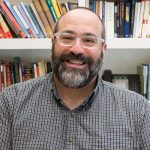
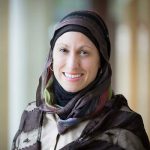
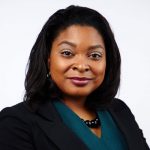
PsalmSeason Project
About the Project
In response to the unfolding global pandemic and upheaval over racial injustice, on June 8, 2020 The Miller Center and Interfaith Youth Core launched a new digital initiative on the Book of Psalms entitled PsalmSeason: An Online Encounter with the Wisdom of the Psalms. The multifaceted project seeks to provide people with a creative context in which to explore their swirling thoughts and feelings through the prism of this ancient and beloved collection of prayer-poems.
The project began with an online PsalmSeason Concert on June 8, followed by the launch of the PsalmSeason digital platform—an 18-week exploration of the Psalms focusing one psalm each week.
Listen to Rabbi Rose discuss the project on Chagigah Radio.
Sign up to receive the 18-week weekly PsalmSeason Digest
PsalmSeason Concert
Watch the PsalmSeason kick-off online concert, featuring performers and poets from several countries, representing different styles and traditions. Learn more about the 18-week PsalmSeason project and read the weekly offerings at ifyc.org/psalmseason.
PERFORMERS AND CONTRIBUTORS (in order of appearance)
Welcome:
Rabbi Or Rose, Director Betty Ann Greenbaum Miller Center for Interreligious Learning & Leadership at Hebrew College and Rev. Paul Brandeis Raushenbush Senior Advisor for Public Affairs and Innovation Interfaith Youth Core http://hebrewcollege.edu/miller-center http://ifyc.org
“Like Rain”
Lyrics and Music by Marty Austin Lamar Performed by Marty Austin Lamar Snokey Music, 2016 @martyaustinlamar http://www.martyaustinlamar.com
“Hesed” (Loving-Kindness)
Written and performed by Alondra Bobadilla Boston Youth Poet Laureate Psalm 10 Music by Jesse and Leah Roberts Performed by Poor Bishop Hooper Copyright Poor Bishop Hooper 2020 http://www.poorbishophooper.com http://www.everypsalm.com
“My Light” (Adonai Ori) – Psalm 27:1
Music by Beth Styles English lyrics: Beth Styles & Neshama Carlebach © Neshama Music Productions, LLC http://www.neshamacarlebach.com
“Hold The Things That I Can’t Carry”
Peter Himmelman Peter Himmelman/ASCAP Publishing administered by Primary Wave http://www.peterhimmelman.com www.bigmuse.com
“Lament”
Composed by Max Richter Song: A Blessing Choreography by Elisa Schroth Performed by Paiter van Yperen http://Ekklesiaballet.org
“Adonai Ro’i” (The Lord is My Shepherd) – Psalm 23
Lyrics: King David Music by Danny Maseng © D. Maseng Performed by Danny Maseng and Michael Skloff http://www.dannymaseng.com
Psalm 23
Performed and Arranged by Nóirín Ní Riain, Owen & Mícheál Ó Súilleabháin http://www.turasdanam.com
“Min Hameitzar” (From the Narrow Straits) Psalm 118:5-6
Composed and performed by Deborah Sacks Mintz http://www.deborahsacksmintz.com
“Jerusalem”
Written by Amy Ziff, Alyson Palmer, Elizabeth Ziff, Betsy Hirsch Performed by BETTY ©BETTYRules Productions/BMI http://www.helloBETTY.com
“Lo Ira” (I Will Not Fear) – Psalm 118
Traditional Moroccan Jewish melody/Yuval Ron Performed by Yuval Ron Ensemble ©Yuval Ron Music (ASCAP) http://www.yuvalronmusic.com
“Searching My Rage”
Written and performed by Drew Drake http://www.thedrewdrake.com
“Come Ye”
Written by Nina Simone Performed by SWEET HONEY IN THE ROCK ® http://sweethoneyintherock.org
“Shir Hama’alot” (A Song of Ascents) – Psalm 126
Music by Joey Weisenberg Performed by Joey Weisenberg © Joey Weisenberg http://www.joeyweisenberg.com
“East Jerusalem/West Jerusalem”
Written by David Broza and Wyclef Jean Performed by David Broza https://davidbroza.net
Haleluyah (Hallelujah . . . Let all that breathes praise the LORD!) – Psalm 150
Music by Nusrat Fateh Ali Khan, as interpreted by Sheva Performed by Rabbi Roly Matalon (Vocals) and B’nai Jeshurun Musicians Dan Nadel (guitar and direction) Ismail Lumanovski (clarinet) Arun Ramamurthy (violin) Satoshi Takeishi (percussion) http://www.bj.org
“My Heart Leapt for Joy” – Psalm 122
Music and adaptation by Vince Anderson Performed by the Rev. Vince Anderson @reverendvince
“Hinei Ma Tov ” (See how good and pleasant it is for brothers and sisters to dwell together) Psalm 133
Composed and sung by the Abayudaya Jewish Community of Uganda Recorded and Compiled by Jeffrey A. Summit from the Smithsonian Folkways Recording CD “Abayudaya: Music From the Jewish People of Uganda” Smithsonian Folkways Recordings 2003 All Photographs Courtesy of Richard Sobol http://www.jeffreyasummit.com
“Ben she’Hazar” (The Returning Son)
Lyrics and music by Ariel Horowitz PRODUCTION TEAM Kyle Homstead Video Editor (Laudable Productions) Aly Palmer Consulting Producer Marilyn Stern Project Coordinator Tom Reid Project Coordinator Leah Carnow Closed Captioning and Translation
Poetry in Times of Peril Event
On July 14, 2020, the Hebrew College-Interfaith Youth Core PsalmSeason project, with co-sponsors Jewish Women’s Archive and Lilith Magazine, presented the online event “Poetry in Times of Peril: Four Women’s Voices.” (Visit the PsalmSeason website at http://ifyc.org/psalmseason)
From the ancient Book of Psalms to contemporary hip-hop, poetry has served as a vital channel through which to express our deepest yearnings, frustrations, and hopes. How might words of poetry help us respond to the current crisis of COVID-19 and the national reckoning with racial injustice? Join us as we engage four outstanding woman poets from different walks of life for a cross-cultural and intergenerational reading and discussion.
Featured Poets:
Alondra Bobadilla
Marilyn Nelson
Alicia Ostriker
Alicia Jo Rabins
Moderator: Dr. Judith Rosenbaum, Jewish Women’s Archive
Sponsors: Jewish Women’s Archive Miller Center for Interreligious Learning & Leadership of Hebrew College Interfaith Youth Core Lilith Magazine To learn more about PsalmSeason visit: http://www.ifyc.org/article/intro-pro…
POET BIOGRAPHIES
Alondra Bobadilla was born and raised in Boston, MA. Her love for writing emerged when she first learned her letters as a young cild. In addition to her writing, she has participated in multiple forms of performance art, finding different ways to express herself beyond poetry. She is a student at Fenway High School and was named Boston’s first-ever Youth Poet Laureate in January 2020.
Marilyn Nelson was Poet Laureate of Connecticut from 2001-2006, has been a Chancellor of the Academy of American Poets and Poet-in-Residence of the Cathedral of St. John the Divine, and has been awarded the Frost Medal, the NSK Neustadt Award, the Los Angeles Times Book Award, and the Ruth Lilly Poetry Prize.
Alicia Ostriker is a poet, scholar, and critic who writes Jewish feminist poetry. She has been called “America’s most fiercely honest poet” by Progressive. Additionally, she was one of the first women poets in America to write and publish poems discussing the topic of motherhood. In 2015, she was elected a Chancellor of the Academy of American Poets. In 2018, she was named the New York State Poet Laureate.
Alicia Jo Rabins is an award-winning writer, musician, performer and Torah teacher and the author of two poetry books, Divinity School (American Poetry Review) and Fruit Geode (Augury Books). Music/performance projects include Girls in Trouble, an indie-folk song cycle about women in Torah, and the forthcoming independent feature film, A Kaddish for Bernie Madoff.
TEXT SELECTIONS
[American Journal] Robert Hayden – 1913-1980 https://poets.org/poem/american-journal ON RAISING
CHILDREN IN A CRUMBLING WORLD Nikita Gill http://ebmultitudes.blogspot.com/2018…
HOMAGE TO MY HIPS Lucille Clifton https://www.poetryfoundation.org/poem…
WON’T YOU CELEBRATE WITH ME Lucille Clifton https://www.poetryfoundation.org/poem…
The Book of Love, The Magnetic Fields from 69 Love Songs https://genius.com/The-magnetic-field…
PIGEON AND HAWK Marilyn Nelson https://www.newyorker.com/magazine/20…
ON BREATHING Alicia Jo Rabins https://aliciajo.com/pandemicpoems/
HESED (“Loving-Kindness”) Alondra Bobadilla https://ifyc.org/article/ps-133-hesed
CHILDREN’S BLOOD Alicia Ostriker
Elul Together
5780/2020
Elul Together
Elul, the month leading up to the High Holy Days, is traditionally an opportunity for introspection, reflection, and self growth. In response to the isolation of the pandemic, Hebrew College launched Elul Together: Preparing for the High Holidays in a Time of Upheaval. The project brought teachings, music, and the sound of the shofar into the homes of our broader community during this time of isolation.
Each week of Elul, we posted videos, art and journal prompts to accompany you through the next week of High Holy Day preparation. Watch, listen, write, make art, and share your reflections on social media with #ElulTogether. We’re in it together.
Updates from President Anisfeld
March 9, 2022
I am writing with an important update about our COVID-related policies and protocols.
As you are probably aware, the Centers for Disease Control has eased mask recommendations for the vast majority of the country and most mask mandates have been lifted locally as well. These changes come in response to a significant decrease in infection rates and the proven increase in protection against severe illness because of the effectiveness of vaccinations and boosters.
Therefore, effective Monday, March 14, students, faculty, staff, renters, and visitors at Hebrew College will no longer be required to wear masks indoors.
We are aware that there may be mixed feelings about this transition in our community. Some will welcome this change with enthusiasm while others may be hesitant and concerned. Some will feel both of these things at the same time!
I want to emphasize four things in this regard:
- While we will no longer be requiring masks, you are encouraged to continue to wear them if that feels like a safer or more comfortable choice for you.
- Anyone who is especially concerned about coming to campus without a mask mandate in place should contact Steffi Bobbin at (617) 559-8640 or sbobbin@hebrewcollege.edu to discuss options regarding continued remote work and/or resources for getting an N-95 mask professionally fitted.
- In order to maximize safety for everyone in our community, especially those who are immunocompromised or living with people at high risk, we will continue to use the various systems we have put in place for air filtration/purification and, of course, as the weather warms, we will also take advantage of opportunities to keep windows open and to gather outdoors.
- It goes without saying – but I’ll say it anyway – that we are a diverse community with different experiences and different perspectives about all kinds of things. I am deeply grateful that one of the things we share is a commitment to living, learning, and working together across those differences – with sensitivity and respect. Please be sensitive to the fact that people have different levels of both risk and risk tolerance and please be respectful of the different choices people will continue to make.
Along with the transition to optional masking, Hebrew College is also removing all restrictions regarding social distancing and eating in group settings.
We will continue to monitor Federal, State and CDC recommendations regarding masking and other protocols that may come back into play as additional information becomes available.
This week we will mark two years, to the day, since we began our COVID protocols at Hebrew College at the end of business on March 12, 2020. As we moved into that Shabbat, the first of many when we would not be able to gather in person as communities for prayer, I shared the following words:
As I wrap myself in my tallit tomorrow morning, I will be keeping all of you in my heart and in my mind’s eye—along with countless others around the country and around the world—knowing that wherever we are, in whatever small corner of the world we have each privately taken a few steps, bent our knees, and opened our hearts, we are standing together before a God who hears, receives, and holds us all.
We have worked hard to hold that awareness in our hearts even when we’ve been physically apart. As we increasingly take steps toward life in community again, may we work hard to hold that awareness in our hearts when we are standing side by side!
December 31, 2021
COVID Policy Update: December 31, 2021
We are continuing our present protocols with some heightened precautions:
- Anyone with any Covid symptoms should stay home. Staff/students should test themselves after symptoms have gone away before returning to the College. A negative PCR test is preferable, but if one is not available, a negative antigen test is acceptable.
- Anyone who has had a Covid exposure and is asymptomatic, is permitted to come to work/school, but they should take a PCR test on day 5 after the exposure. (Again, if a PCR test is not available, a negative antigen test is acceptable.)
- Anyone who has been traveling over break is not required to test upon returning to Hebrew College unless they are symptomatic. In this case, they should test themselves before coming to work/school.
- If you contract Covid, you must stay home for five days from the first symptoms in line with the recent guidelines from the CDC. A negative test is required before returning. The College will not close the building if one person contracts Covid. If there is an outbreak, we will evaluate the situation at that point.
- Our policies in the building remain the same. Masks must be worn (correctly) at all times. Food can only be eaten if you are alone in a classroom or socially distant in the cafeteria.
We strongly urge all staff and students who have not yet received their booster shots to do so before returning to campus.
Updated August 20, 2021
Dear Hebrew College Community,
We, like many of you, are closely monitoring the recent uptick in COVID-19 cases. In consultation with our medical advisors, as well as other Jewish institutions, and local colleges and universities, we have decided to modify our guidelines due to the impact of the Delta variant. While the setback is discouraging for all of us, I know we will continue to come together with generosity of spirit to look out for each other’s health and wellbeing and to contribute to local and national efforts to overcome this pandemic.
Here is an overview of our updated COVID related protocols and guidelines as of August 20, 2021:
- All students are required to show confirmation of vaccination.
- Effective August 31, all faculty and staff are required to show confirmation of vaccination.
- We have reinstated a mask mandate, regardless of vaccination status. All students, staff, faculty, renters, and visitors will be required to wear masks when in the building. Fortunately, with everyone properly masked, we will be able to gather indoors for most regular activities, including orientation, fall classes, davening, staff meetings, and public events.
- We are restricting food or drink at indoor communal events. No food or beverage may be consumed in the building unless you are in a room alone. With the start of the fall semester, we will have limited areas designated for eating, with clearly marked socially distanced seating.
- As a reminder, we are continuing to require all those who are eligible for vaccination (everyone ages 12 and older) to be vaccinated before coming to the campus. Exemptions will be made only for religious or medical reasons on a case-by-case basis and proof of the exemption will be required.
- If you are not feeling well, please do not come to campus. If you have experienced fever, body aches, or loss of taste or smell – or if you have been exposed to someone who has tested positive for the virus — you are required to have a negative COVID test before returning to campus.
I want to reiterate that the protocols described here may, of course, be subject to change, based on future developments regarding the pandemic, community health and awareness, or policies put in place by the Commonwealth of Massachusetts. Thanks, as always, for your flexibility, creativity, patience, dedication, and hard work.
Warmly and with all my very best wishes for the new year,
Sharon
July 13, 2021
Dear Hebrew College Community,
The pandemic conditions in the U.S. continue to improve, thanks to ever-increasing levels of vaccination across the country. As of today, over 4 million residents in the Commonwealth of Massachusetts have been fully vaccinated.
Encouraged by the prospects of moving toward a post-pandemic normal, we are making plans to reopen 100 percent of our campus resources to offer in-person and hybrid educational experiences this fall 2021. Staff will be encouraged to continue to work in a hybrid mode, combining remote work with regular presence on campus, in coordination with your supervisor and colleagues.
After careful consideration, Hebrew College has decided to join the growing ranks of hundreds of higher education institutions across the country — and nearly all those within New England — in requiring its students, faculty, staff, regular renters, and contractors returning to work or study on campus to be fully vaccinated against COVID-19 by August 15, 2021.
Exemptions from COVID-19 vaccination requirements will be made only for religious or medical reasons on a case-by-case basis.
Everyone ages 12+ who lives, works, or studies in Massachusetts is eligible to get the COVID-19 vaccination and walk-in appointments are available across numerous locations. Students in Massachusetts, including those hailing from other states or countries, are eligible to be vaccinated.
Please do not hesitate to contact Steffi Bobbin in our HR department if you have any questions.
Also, please be aware that, based on future developments regarding the pandemic, community health and awareness, or policies put in place by the Commonwealth of Massachusetts, the protocols described here may be subject to change.
Wishing everyone a healthy and relaxing remainder of the summer, and very much looking forward to seeing you all in person this fall!
Best,
Sharon
FAQ’s
How does someone apply for an exemption?
To be considered for a medical exemption, a person is required to present a letter to the Director of Human Resources from a licensed medical doctor stating that they are exempt. No personal information needs to be included in this letter. For a religious exemption, a person should also present a letter in writing to the Director of Human Resources. Each instance will be reviewed by the Leadership Team and handled on a case-by-case basis.
What is our policy regarding visitors?
Visitors must be vaccinated or masked to come into the building. We will currently be using the “Honor System” — no documentation required.
Who needs to wear a mask?
Anyone who is not yet fully vaccinated. (Others may choose to wear a mask voluntarily.)
Who doesn’t need to wear a mask?
Anyone who is fully vaccinated.
Do students need to provide immunization documentation?
Yes.
Do faculty, staff, renters, or visitors need to provide immunization documentation?
No.
Do the rules change when outside in the courtyard or on the cafeteria patio?
No masks are required outdoors.
What is expected of someone who is not feeling well?
People who are not feeling well are encouraged to stay home. If the feeling persists, they should consult with their physician.
What if a person has been tested for COVID-19 and is positive?
A person who has tested positive should stay home and follow all of the CDC guidelines.
What if a person has been advised of exposure via contact tracing?
A person who has been advised of exposure should stay home and follow all of the CDC guidelines.
June 2021
Current Hebrew College COVID/Mask Policy
- Face coverings will no longer be required both indoors and outside for those who have been fully vaccinated.
- For those who have NOT been fully vaccinated, face coverings will still be required both indoors and outside (such as in the courtyard or on the dining room patio).
- Visitors are asked to check in at the front desk to be advised of our policy.
July 23, 2020
Hebrew College has worked to develop a fall plan that prioritizes public health and safety, while striving to create as many opportunities as possible for in-person community, connection, and learning. At the same time, building on the experience we gained last semester, we are committed to enhancing the learning experience for students in those classes that will continue on Zoom, and we are dedicating time and resources this summer to ensure that faculty are well supported as they prepare courses for virtual and hybrid settings.
We are grateful to be part of such a caring community, and confident that, together, we will be able to take on this challenge in a spirit of mutual responsibility and support.
Health & Safety Guidelines
Our partial return to campus this fall will require a deep commitment on the part of each and every member of our community to abide by health and safety protocols, both on and off campus. Preliminary information about the health and safety precautions for those coming to campus include:
- Wear masks at all times in the building.
- Practice social distancing at all times in the building.
- Stay home with any warning signs of COVID. Everyone entering the building will be required to answer a series of health questions to ensure that people who are experiencing any symptoms return home.
- All eating will be limited to designated areas with socially distanced seating.
- Daily cleaning of frequented common areas such as bathrooms and classrooms will be enhanced.
Community Education Programs
All of our Community Education classes and programs — including Adult Learning, Teen Learning, Miller Center, and Professional Development for rabbis and educators — will be held online for the fall semester, using Zoom and other resources for distance learning and community building.
Graduate Leadership Program
The Rabbinical School and the Cantorial Program will adopt a hybrid approach for the fall semester, with roughly half of the classes in person and half on Zoom. Any student who is unable to be physically present for classes due to health considerations will be able to take all of their classes online. All classes will move to a virtual format after Thanksgiving. Our online Masters of Jewish Education and Masters of Jewish Studies classes will continue in their online format throughout the year.
Faculty and staff
Faculty and staff will be able to begin to return to campus this fall, following the protocols outlined above, as well as other procedures that we will implement in accordance with state guidelines and recommendations from our medical consultants. To ensure effective social distancing, we will encourage those who are able to continue to work remotely throughout the fall semester to do so, and we will limit the number of staff who are on campus at any given time.
April 1, 2020
Dear friends,
I hope that you and your loved ones are healthy and safe, and holding up as well as possible during this time.
I’m writing to let you know that, as of yesterday, we have made the difficult decision not to gather in person for our Commencement exercises and Ordination ceremonies on June 7.
This is a real loss for all of us, but especially for those of you—our graduating students and your family members and friends—who have been looking forward to this moment for years. We are currently in the process of determining how best to mark these occasions, and will do so in close collaboration with you—ensuring that there will be a meaningful opportunity for us to gather as a community to honor and celebrate your accomplishments.
As I’m sure you are all aware, it has become clear that the current social distancing and stay-at-home measures being mandated in Massachusetts and around the country are likely to continue at least through early May, and quite possibly beyond. While none of us can predict the future, we are doing our very best to plan based on the information we have now. As long as non-essential businesses are asked to remain closed in Massachusetts, we will continue to operate remotely, in order to do our part to help reduce the public health risk posed by the COVID-19 pandemic. All of our graduate and community courses will continue to be taught remotely through the end of the spring semester. All of our public programs in April and May will be postponed or moved to a virtual platform.
This has been a challenging period, to say the least, and our uncertainty about what the future will bring only compounds the sense of unease that we all feel. At the same time, I have seen and heard countless daily examples of flexibility, resilience, understanding, and grace as we have collectively adapted to our new reality. I could not be more proud of the way that our community has risen to this challenge, not only sustaining our own teaching and learning with tremendous dedication, but also looking beyond for ways to be of service to the wider community. So many of you have offered your skills, your wisdom, your creativity, and your (virtual) presence to be of service at this time. I hear every day from people throughout the community who are moved by and grateful for your efforts.
Please continue to take care, and be well. And feel free to reach out to me at any time.
Warmly, and with all my very best wishes for continued health and strength,
Sharon
March 23, 2020
Dear Hebrew College Community,
In light of Governor Baker’s “Stay at Home” advisory earlier today, effective at noon on March 24, the Hebrew College building will be closed at least until April 7. We will continue to stay in regular communication as we find ways to respond together to this challenging and rapidly evolving situation.
All best wishes for continued strength and good health.
Sharon
March 17, 2020
Dear Hebrew College Community,
I hope that, wherever you are reading this, you and yours are safe and well, finding support, strength, and connection amidst the challenges and uncertainties of this time.
As all of us adjust to the rapidly evolving realities of the COVID-19 pandemic, we will do our very best to stay in touch with you, keep you informed about what’s happening at Hebrew College, let you know what resources are available to you, and give you a taste of the life-giving work our students, faculty, and alumni are doing as they continue to study and teach Torah, build community, and care for individuals throughout Greater Boston, all over the country, in Israel, and around the world.
For now, I am writing with an important update about our Annual Spring Event on April 29. While it has become clear that we will not be able to gather in person for this year’s event, we are already planning an inspiring series of virtual programs over the coming months, celebrating our honoree, Rabbi Rim Meirowitz, as well as Esther Award recipient, Jill Segal of blessed memory, and exploring this year’s timely theme: Leadership, Learning, and Love. Stay tuned for more information soon, and please continue to hold April 29 for one of the programs in our virtual series.
These are extraordinary times, and it feels like there is so much that is uncharted and unknown. And yet, such times can also help us focus on what matters most, and can remind us of what we already know—that we need dedicated leaders who are inspired and guided by a deep sense of service and love; that we need to continue learning, to stay connected to each other and to nurture a sense of history as well as a sense of hope; that, even as we are physically isolated from each other during this period, for the greater good, we urgently need to find ways to turn toward each other with love.
We will be following up soon with more details about our plans for virtual spring programming on the theme of Leadership, Learning, and Love. In the meantime, as a hint of things to come, and a treat for the spirit in these troubled times, I invite you to listen to this beautiful piece performed by Rabbi Jessica Kate Meyer, Rab`14, Rabbi/Chazzan at The Kitchen in San Francisco, CA.
I am so grateful to be part of a community where people are responding to this unfolding situation with such flexibility, patience, resilience, and shared concern. I look forward to staying in touch, and to hearing from you if you have questions or suggestions about how we can best be of service to you and your community during this time.
With prayers for health and peace,
Sharon
March 16, 2020
Dear Hebrew College Community,
I hope that you and your loved ones are all well, and holding up amidst the stress and uncertainty of this challenging time. I’m so grateful for the many ways in which people have been reaching out—within our community and beyond—to offer help, acts of kindness, and both practical and spiritual support.
I’m writing with a brief update on our plans for this week at Hebrew College, as we continue to respond to the unfolding situation with COVID-19.
First and foremost, I am so pleased to share the good news that, thankfully, our adult learning student and her husband, who both tested positive for the virus last week, are recovering and doing very well.
As you have all likely heard by now, Governor Baker put in place this evening a number of public measures for the State of Massachusetts, including banning gatherings larger than 25 people, closing all public schools through April 7, and underscoring the need for as much “social distancing” as possible to try to contain the health risk posed by this pandemic.
We are now moving forward with the following plans for this week:
- We will resume all courses online as of Wednesday, March 18, and continuing at least until after the Passover break. Graduate courses (rabbinic, cantorial, and education) will be using Schoology, and Community Education courses (adult learning, teen programs, and Miller Center programs) will be using Zoom. Many, many thanks to all of the faculty and staff who have been working so hard to make this transition as smooth and successful as possible.
- Hebrew College will be closed all week.
- All public meetings, events, and gatherings at the College are being cancelled or made virtual until further notice. We, of course, very much hope that we will be able to resume public gatherings later this spring, but we don’t yet know whether and when that will be possible. We so appreciate everyone’s understanding and flexibility as we continue to make decisions informed by the best guidance available to us regarding communal health and safety.
- We are inspired by the wisdom and creativity of this community in response to this crisis—the beautiful teachings that have been shared by students, faculty, and alumni, and the many wonderful ideas for staying connected even while we have to be physically distanced from each other. May we continue to have the resilience to rise to this occasion, as individuals, and as a community.
With appreciation and admiration,
Sharon
March 13, 2020
Dear Hebrew College Community,
I have been awed—over these last few days—by the dedication, resilience, compassion, and calm of our community in the face of this difficult and unsettling time. My deep admiration and appreciation go out to you all.
As we prepare to move into Shabbat, I am writing with a couple of important updates, and some very brief words of Torah.
Our commitment to learning continues
Our commitment to learning continues, as we move all of our classes to virtual learning environments until further notice.
As of Wednesday morning, March 18, we will be resuming all graduate classes (Rabbinic, Cantorial, and Education) through our online Schoology platform.
As of Wednesday morning, March 18, we will be resuming all community education classes (Adult Learning, Teen programs, and Miller Center programs) through Schoology and/or through the use of enhanced Zoom technology.
Thank you to the extraordinary faculty and staff in all of our programs for their tremendous efforts to ensure that—while we are physically separated for now—our dedication to meaningful, passionate Jewish learning and community is creatively adapted, yet undiminished. Thank you to our dedicated IT team for their tireless work to ensure that this transition is as smooth and successful as possible. And, finally, thank you to our students—we are inspired by your fierce commitment to and love of learning, and appreciate your flexibility and patience as we adjust to this rapidly evolving situation.
Our commitment to staying safe and connected continues
Our physical campus remains closed until further notice. We are in the process of doing a deep cleaning and disinfecting over the next few days, and hope to reopen for limited staff and faculty use by the middle of next week. We will, however, continue to urge people to work remotely for as long as necessary, both to prioritize the health and safety of our own community, and to do our part to help minimize the public health risk at this time.
That said, we are actively developing creative ways of staying connected—not only through online learning, but through virtual prayer, community-building efforts, special online programs, and more. Stay tuned for much more information about this over the coming days!
Our commitment to sharing Torah continues
We are blessed to be part of a community that is thinking about how to bring the resources of our tradition to bear on this moment—spiritually, intellectually, ethically, interpersonally. Please go to our website if you are interested in reading or listening to some of what our students, alumni, and faculty are writing in response to the challenges of this time.
For now, I offer just a few brief thoughts as we prepare to move into this Shabbat.
****
As we move into this Shabbat and beyond, many of us are—among so many other things—adjusting to the idea of davening alone, physically isolated from the communities that nourish us, and the sense of connection that helps lift and carry our prayers.
This midrash from Shemot Rabbah (Parashat B’Shallach) has been echoing in my mind as I think about the spiritual task before us. It is part of a series of sustained reflections on what it means for God to be “shome’a tefilah” (One who hears prayer).
“In the hour that Israel prays, you do not find that everyone prays as one – but rather each and every community prays in its own way and time, this congregation first and after that another congregation, and after all the congregations have finished all of their prayers, the angel appointed over all tefilot gathers up all the prayers that all of the congregations have prayed and makes out of them a crown and places it upon the head of the Holy Blessed One. Davar acher [another interpretation]: A human being can’t hear a conversation of two people speaking at once; but the Holy Blessed One is not like that. Everyone is praying at the same time and God can hear and receive all of those prayers.”
Somehow, I am finding it comforting to keep this image in mind right now. I have loved it for a long time, this exquisite idea that God wears a crown made of human longing and praise. But, suddenly, the midrash also speaks to me in a new way in this moment – I think because it speaks to the sense of deep connection in the face of separation that many of us are aching to hold onto now.
As I wrap myself in my tallit tomorrow morning, I will be keeping all of you in my heart and in my mind’s eye—along with countless others around the country and around the world—knowing that wherever we are, in whatever small corner of the world we have each privately taken a few steps, bent our knees, and opened our hearts, we are standing together before a God who hears, receives, and holds us all.
With love and wishes for a safe, sweet, and peaceful Shabbat,
Sharon
March 11, 2020
Dear Hebrew College Community,
I am writing to let you know that, unfortunately, we learned this afternoon that one of our community learning students tested positive for the coronavirus (COVID-19). Our thoughts are with her and her family and we wish them a quick and full recovery.
Because this student attended a class at Hebrew College last week, we made the decision, in consultation with local medical professionals, to close the building as of the end of the work day today for deep cleaning and disinfecting. While the risk of exposure remains relatively low, we are acting swiftly and prudently because the health and well-being of our students, faculty, and staff are the College’s highest priority. We also feel a deep sense of responsibility at this time to do our part to contribute to collective efforts to address and contain this serious public health risk.
This new development has accelerated our plans to move all of our graduate and community learning classes and Beit Midrash study to virtual instruction for the coming weeks. As of March 11, we are canceling all classes that meet in the Hebrew College building until further notice. We hope that it will not take more than a few days to prepare for a full transition to remote learning. During this time, staff will be working remotely. Please check this page for updates on our progress toward that goal, and our plans for ensuring that our teaching and learning as a community continues.
We also want to take this opportunity to remind you of the general precautions recommended by the CDC. For easy access to clear and detailed information, follow this link.
I am proud and grateful to be part of a community where people are responding to this unfolding situation with such flexibility, patience, resilience, and calm. I look forward to continuing to find ways to stay connected and care for each other, even as we take these precautionary measures that require greater physical distance for the time being.
With much appreciation,
Rabbi Sharon Cohen Anisfeld
President, Hebrew College
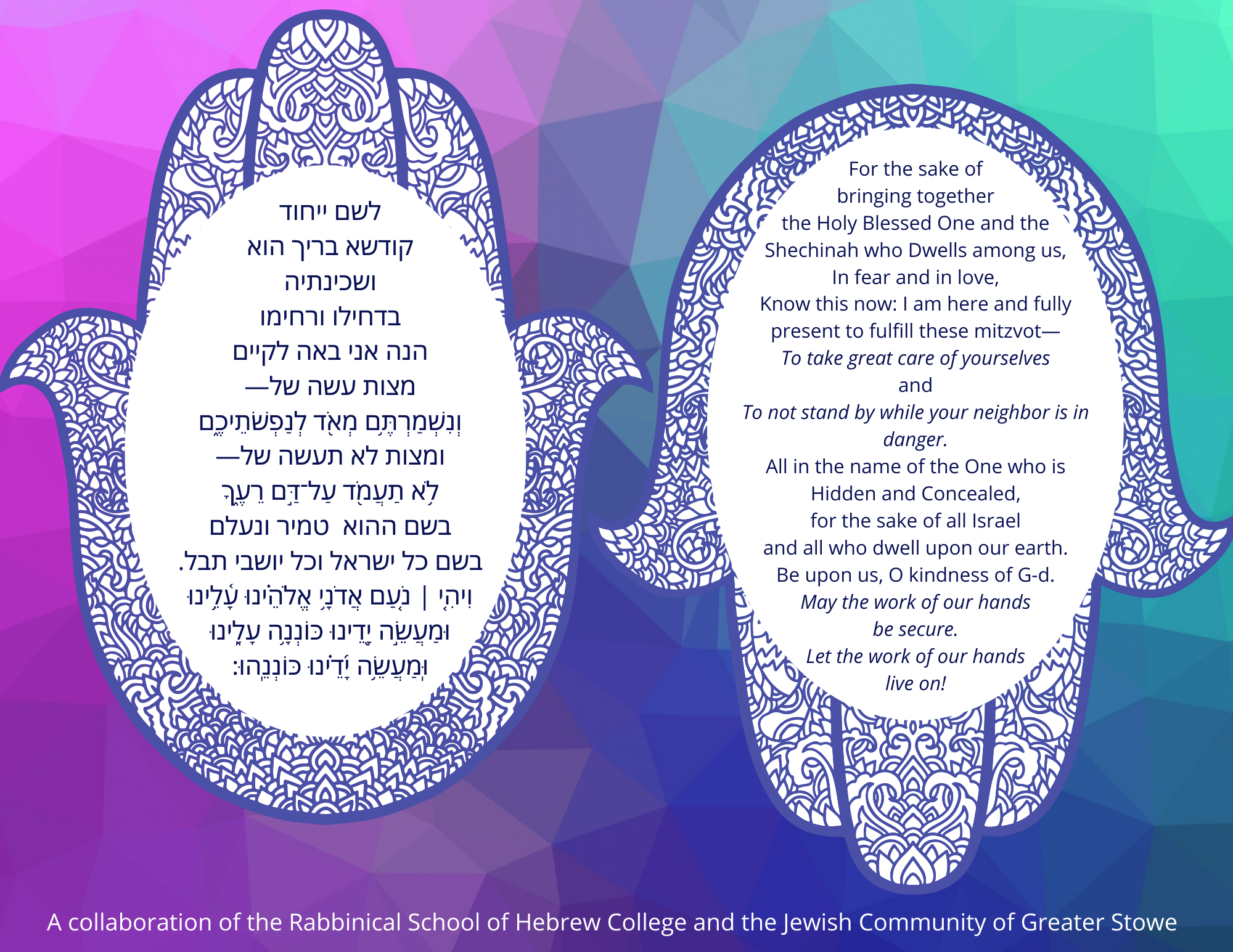




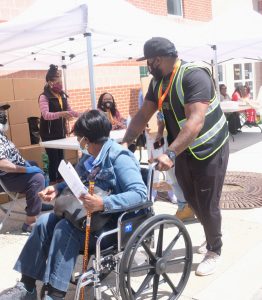 The Need
The Need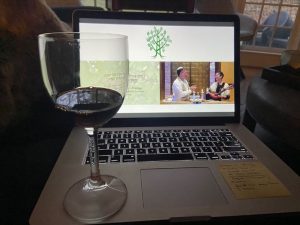 Inaugural Hebrew College Art Exhibit: “Faith In Isolation Expressed”
Inaugural Hebrew College Art Exhibit: “Faith In Isolation Expressed”